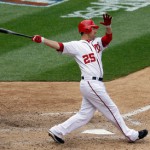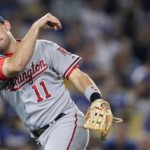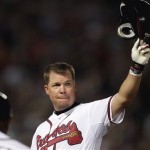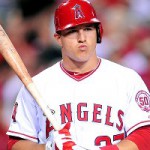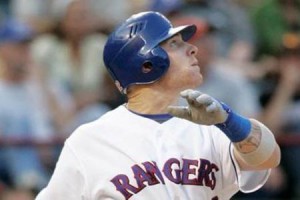I like doing this post every year (here’s 2012’s version, here’s 2011’s version), looking for trends in baseball’s most successful teams. How do the best teams generally construct their rosters?
Borrowing from last year’s post, there are four main ways teams can acquire players:
- Draft/Development: The player is with the original team that drafted him. In the case of international free agents, if they’re signed as 16-year olds they are considered in this category as well (i.e. Jose Fernandez is a developed player despite being acquired as an international “free agnet” while Yasiel Puig). It could be better defined as “Club developed players.”
- Trade MLBers: The player was acquired by the team by virtue of trading an established MLB player. Most of the time these days, this means the player was acquired as a prospect (since most trades seem to be of the prospect-for-established player kind).
- Trade Prospects: The player was acquired by the team by virtue of trading prospects. This is essentially the reverse of #2.
- Free Agency: The player was acquired in free agency. This category also includes several other types of acquisitions: waiver claims, Rule-5 draftees and cash purchases. These three categories are lumped together since all three indicate that a team has acquired a player with zero outlay in terms of development or prospects.
Sometimes these trades get a bit muddled; if you send a combination of major and minor league talent to the other team, which category does it fall under? But for the most part trades are simply categorized.
Now, here is the summary of roster construction and “Construction Strategy Category” for all 10 teams that made this year’s playoffs. I only count the “core players” on a team for this analysis. The core players is defined as the 5-man starting rotation, the setup and closer, the 8 out-field players, and the DH for AL teams. I didn’t extend this all the way to the 25-man roster, figuring that these core 15-16 players are the main reasons teams win and advance. That and huge chunks of the bullpen and the bench are either fill-in FAs or draftees and it would skew the analysis of how teams really got to the playoffs. Here’s the summary (the table is sorted by count of Draftees):
| Team | Drafted/Developed | Traded Prospects | Traded MLBs | FA/Waivers | Constr Method |
| Boston | 7 | 1 | 0 | 8 | #4 |
| Detroit | 5 | 4 | 2 | 5 | #2/#4 |
| Oakland | 3 | 1 | 7 | 5 | #3 |
| Tampa Bay | 6 | 1 | 4 | 5 | #1 |
| Cleveland | 4 | 1 | 7 | 4 | #3 |
| St. Louis | 10 | 2 | 2 | 1 | #1 |
| Atlanta | 8 | 0 | 5 | 2 | #1/#3 |
| Cincinnati | 9 | 2 | 2 | 2 | #1 |
| Pittsburgh | 5 | 3 | 3 | 4 | #1/#3 |
| Los Angeles Dodgers | 3 | 4 | 1 | 7 | #4 |
So, what are these four Team Construction Methods? Lets go one by one:
Method #1: Build from within nearly 100% (Tampa, St. Louis and Cincinnati the best examples, Atlanta and Pittsburgh to some extent): Two great fact points drive this team construction for two of the best example teams in this category:
- 18 of St. Louis’ 25 man post season roster was drafted by the team and is still with the team. Another 5 total guys were acquired in trade (including Adam Wainwright who was acquired more than a decade ago).
- When Roberto Hernandez got a start this past April, it broke a nearly 8-season long trend of Tampa having every one if its starts being taken by a starting pitcher developed in house.
These are easily the two best examples in the game of success from almost entirely in-house player development. St. Louis has one core Free Agent (Carlos Beltran and only two on its entire playoff roster). Cincinnati isn’t too far behind with its sole major FA acquisition on this year’s roster being Aroldis Chapman. Atlanta and Pittsburgh do qualify for this (Atlanta has a huge number of home-grown players), but also have made enough trades/signings to create their current rosters that they don’t entirely fit here fully.
Method #2: Ride your developed Core and use your prospects to acquire big names: Detroit (to a certain extent). Detroit has a good core of home-grown guys to which they’ve augmented by trading prospects and major FA acquisitions to arrive at their current incarnation; a very good, very expensive squad.
I continue to classify Washington in this category as well, 6 of our core 15 were drafted and another 3 were acquired by flipping our prospect depth.
Method #3: Wheel and Deal: Oakland, Cleveland entirely, then Atlanta & Pittsburgh to a certain extent. Is roster-turnover the new market inefficiency? Oakland’s 2013 team featured an entirely new infield from last year’s 2012 AL West winning team. Only 3 of Oakland’s core 16 players were home-grown this year. Billy Beane’s M.O. of wheeling and dealing is paying major dividends; his trades of established major leaguers to acquire prospects has resulted in two AL West divisional crowns in a row. Meanwhile Cleveland has adopted some of the same strategy, with just one real home grown starter and a whole batting order assembled via trade and free agency.
Atlanta and Pittsburgh each have done their fare share of major trades/signings lately, with Atlanta ending up with Justin Upton and Pittsburgh ending up with 4/5ths of a rotation thanks to big moves. So while both teams have their cores in player development, smart transactions have made big differences in their 2013 playoff pushes.
Method #4: Spend what it takes to win: Boston, Los Angeles Dodgers and Detroit to some extent. Certainly no one can argue with Los Angeles’ planned path; they more than doubled their team payroll from 2012 to 2013 by taking hundreds of millions of dollars off the hands of … Boston, who still remains in this category despite a large bulk of their core 16 being home grown. You just can’t have a $150M payroll and not be categorized as a “spend what it takes to win” team. Detroit’s owner has opened up the pocketbook time and again to try to buy a winner, so they aren’t entirely in this category but they’re getting close.
So, what’s the *right* way to build your team? I guess it depends; clearly all four of these methods can result in playoff appearances. Perhaps its better to look at the downsides of each method:
Method #1 depends on a long track record of consistent player evaluation and drafting. St. Louis, in my opinion the best franchise in the game, has a great track record. Their 2009 draft alone produced 5 of their 25 man roster, and Michael Wacha was a 2012 draft pick who shot to the majors and may be the steal of that draft. But getting there takes time and talent; to me clearly teams like the Cubs and Houston are re-booting in order to get to this point. It tests the patience of your fan base and your RSNs (as Houston is learning). Kansas City has tried this method for years and years and has had little luck. Seattle went this route mostly and a slew of big-name prospects have failed to really pan out. So you need great player development and some draft-day luck. The new CBA is going to make this method harder and harder to do.
Method #2 is slightly less harrowing than going entirely by method #1, but does depend on finding trading partners and finding matches for your spots. This is where I classify the Nats right now; we have a good core of home-grown guys earned on the backs of several years of last place finishes/high first round draft picks. And now we’ve parlayed some prospect depth into two key members (Gio Gonzalez and Denard Span). The downside of this method basically is that your farm system gets depleted very quickly. Washington’s farm system went from the best in the game to being ranked in the low #20s after matriculations, losses of first round picks and the two big trades. Suddenly your team has no big-time rising prospects, your major league team has no reinforcements coming, and you soon devolve more into category #4, spending hand over fist to extend your stars and to fill in holes. Kind of like where Philadelphia is right now.
Method #3 can go bad, fast. If your trades don’t work out … you look bad, quickly. You’re also buying yourself some known down years (think what Miami is doing; they clearly punted on 2013 while trading away a ton of salary and major league assets). That can be tough on the fan base; Oakland and Miami’s fan bases already have their own problems, but Cleveland struggled to sell seats this year even on their way to 90 wins.
Method #4 can go bad, fast as well … and expensively so. Only three of the game’s 11 most expensive teams made the playoffs this year. The Yankees got 85 wins for their $228M in payroll and look like they may be in trouble for a time to come. Philadelphia? 73 wins. The Angels and Giants were losing teams. Free Agents are generally being paid for what they DID, not what they’re going to do. And Free Agents are almost always in their late 20s/early 30s, entering their natural decline years, and invariably are going to be overpaid for their performance. If you want to build your team through FA, consider that new estimates value a “win” at roughly $7M on the open market … meaning that to build just a 90 win team through free agency would cost more than $300M in free agent dollars. Or about what Robinson Cano wants this off-season. There will continue to be high-payroll teams of course (that RSN money has to get spent somewhere), but I feel as if the industry is going to get smarter about these long term deals. One look at the Angels last few off-seasons should give you every bit of proof you need to know; hundreds of millions committed to aging sluggers, several very productive prospects traded away chasing glory, and the Angels (even with the best player in the game at $500k/year) look lost.
I think the answer to “which way is best” really resides in the skills of the organization at large. You can succeed using all four methods … its just how *long* can you continue to succeed?
